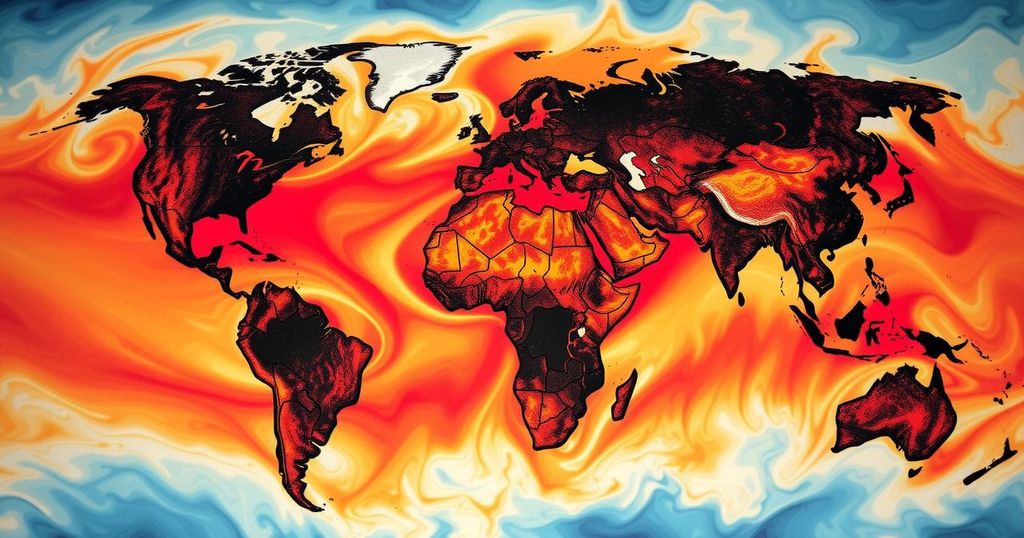2024 has emerged as the first full year with global temperatures surpassing 1.5 degrees Celsius above pre-industrial averages, according to scientists. The trend highlights an urgent need for governments to fulfill their climate commitments under the Paris Agreement amid rising greenhouse gas emissions and visible climate impacts globally.
On January 10, scientists reported that 2024 marked the first complete year in which global temperatures exceeded 1.5 degrees Celsius above pre-industrial levels. This significant finding, confirmed by the European Union’s Copernicus Climate Change Service (C3S), highlights that climate change is compelling global temperatures to reach unprecedented extremes not previously experienced by modern civilization. C3S Director Carlo Buontempo emphasized that every month of 2024 was the hottest or second-hottest on record for that specific month.
In addition, the average global temperature in 2024 was determined to be 1.6 degrees Celsius higher than that of the pre-industrial period of 1850-1900. This alarming trend shows that each of the last decade’s years has ranked among the ten warmest since records began. The UK’s Met Office corroborated the breach of the 1.5 degrees Celsius threshold, projecting an average temperature of around 1.53 degrees Celsius for the year. Meanwhile, US climate data is expected to be released to confirm these trends.
Governments worldwide have pledged, under the Paris Agreement of 2015, to limit average temperature increases to below 1.5 degrees Celsius to avert more severe climate crises. However, the occurrence of 2024 as the first year surpassing this threshold does not constitute a breach of this target, as it pertains to longer-term averages. Mr. Buontempo indicated that if greenhouse gas emissions continue to rise, surpassing the Paris goal may soon become a reality, but there remains an opportunity for countries to significantly reduce emissions and alter this trajectory for a better future.
The evidence of climate change impacts is evident across every continent, affecting populations from wealthy to impoverished nations. This year has witnessed catastrophic events, including raging wildfires in California, destructive fires in Bolivia and Venezuela, severe floods in Nepal and Sudan, and deadly heatwaves in Mexico and Saudi Arabia. Such events illustrate the escalating severity of climate-related disasters as a result of a warming planet, which has allowed the atmosphere to accumulate a higher volume of water vapor than ever before.
Despite the alarming rise in disaster-related costs, there has been a noted decrease in political will to invest in emissions reductions in several nations. Notably, the incoming U.S. president, Donald Trump, has publicly derided climate change as a hoax, contradicting the overwhelming scientific consensus that emphasizes its human-induced origins and dire consequences if unaddressed. The United States endured 24 climate and weather-related catastrophes in 2024, each causing damages exceeding $1 billion.
Experts like Professor Chukwumerije Okereke of the University of Bristol have emphasized that surpassing the 1.5 degrees Celsius milestone should serve as a wake-up call for political leaders to fulfill their obligations in combating climate change. He asserted, “Despite all the warnings that scientists have given, nations…are continuing to fail to live up to their responsibilities.” Furthermore, C3S noted that atmospheric carbon dioxide concentrations reached a new high of 422 parts per million in 2024. Research scientist Zeke Hausfather from Berkeley Earth anticipates that while 2025 will likely rank among the three warmest years, it will not surpass 2024. This expectation is largely due to the influence of El Nino in early 2024, which enhances warming but is nearing a transition toward the cooler weather pattern, La Nina.
The report focuses on the critical milestone of global temperatures surpassing 1.5 degrees Celsius above pre-industrial levels for the first time entirely in 2024. This threshold is significant as it aligns with international efforts to mitigate climate change impacts as established by the Paris Agreement. The rising temperatures have been linked primarily to human activities, specifically the burning of fossil fuels leading to higher greenhouse gas emissions, which intensify climate-related challenges across the globe. The data comes from authoritative sources, including C3S, which tracks climate changes, emphasizing the urgent need for collaborative global action to reduce emissions and adapt to climate impacts.
In conclusion, 2024’s confirmation as the first year exceeding 1.5 degrees Celsius of global warming signifies a pivotal moment in climate science and policy. With catastrophic climate events occurring worldwide and atmospheric carbon dioxide levels reaching alarming highs, it is imperative for governments to reaffirm their commitments to reducing emissions. Enhanced political action and collective responsibility are critical to altering the trajectory of climate change and protecting future generations from its dire consequences.
Original Source: www.straitstimes.com






